Uh, yeah, I'd really need a quick input from someone without creator's eyes. Something's wrong in here, according to my scalacheck tests... but I don't really know enough about it to know where it's wrong.
case class Matrix(_1: (Float, Float, Float, Float), _2: (Float, Float, Float, Float),
_3: (Float, Float, Float, Float), _4: (Float, Float, Float, Float)) extends Immutable {
def invert = {
val _11 = _2._2 * _3._3 * _4._4 - _2._2 * _3._4 * _4._3 - _3._2 * _2._3 * _4._4
+_3._2 * _2._4 * _4._3 + _4._2 * _2._3 * _3._4 - _4._2 * _2._4 * _3._3
val _21 = -_2._1 * _3._3 * _4._4 + _2._1 * _3._4 * _4._3 + _3._1 * _2._3 * _4._4
-_3._1 * _2._4 * _4._3 - _4._1 * _2._3 * _3._4 + _4._1 * _2._4 * _3._3
val _31 = _2._1 * _3._2 * _4._4 - _2._1 * _3._4 * _4._2 - _3._1 * _2._2 * _4._4
+_3._1 * _2._4 * _4._2 + _4._1 * _2._2 * _3._4 - _4._1 * _2._4 * _3._2
val _41 = -_2._1 * _3._2 * _4._3 + _2._1 * _3._3 * _4._2 + _3._1 * _2._2 * _4._3
-_3._1 * _2._3 * _4._2 - _4._1 * _2._2 * _3._3 + _4._1 * _2._3 * _3._2
val _12 = -_1._2 * _3._3 * _4._4 + _1._2 * _3._4 * _4._3 + _3._2 * _1._3 * _4._4
-_3._2 * _1._4 * _4._3 - _4._2 * _1._3 * _3._4 + _4._2 * _1._4 * _3._3
val _22 = _1._1 * _3._3 * _4._4 - _1._1 * _3._4 * _4._3 - _3._1 * _1._3 * _4._4
+_3._1 * _1._4 * _4._3 + _4._1 * _1._3 * _3._4 - _4._1 * _1._4 * _3._3
val _32 = -_1._1 * _3._2 * _4._4 + _1._1 * _3._4 * _4._2 + _3._1 * _1._2 * _4._4
-_3._1 * _1._4 * _4._2 - _4._1 * _1._2 * _3._4 + _4._1 * _1._4 * _3._2
val _42 = _1._1 * _3._2 * _4._3 - _1._1 * _3._3 * _4._2 - _3._1 * _1._2 * _4._3
+_3._1 * _1._3 * _4._2 + _4._1 * _1._2 * _3._3 - _4._1 * _1._3 * _3._2
val _13 = _1._2 * _2._3 * _4._4 - _1._2 * _2._4 * _4._3 - _2._2 * _1._3 * _4._4
+_2._2 * _1._4 * _4._3 + _4._2 * _1._3 * _2._4 - _4._2 * _1._4 * _2._3
val _23 = -_1._1 * _2._3 * _4._4 + _1._1 * _2._4 * _4._3 + _2._1 * _1._3 * _4._4
-_2._1 * _1._4 * _4._3 - _4._1 * _1._3 * _2._4 + _4._1 * _1._4 * _2._3
val _33 = _1._1 * _2._2 * _4._4 - _1._1 * _2._4 * _4._2 - _2._1 * _1._2 * _4._4
+_2._1 * _1._4 * _4._2 + _4._1 * _1._2 * _2._4 - _4._1 * _1._4 * _2._2
val _43 = -_1._1 * _2._2 * _4._3 + _1._1 * _2._3 * _4._2 + _2._1 * _1._2 * _4._3
-_2._1 * _1._3 * _4._2 - _4._1 * _1._2 * _2._3 + _4._1 * _1._3 * _2._2
val _14 = -_1._2 * _2._3 * _3._4 + _1._2 * _2._4 * _3._3 + _2._2 * _1._3 * _3._4
-_2._2 * _1._4 * _3._3 - _3._2 * _1._3 * _2._4 + _3._2 * _1._4 * _2._3
val _24 = _1._1 * _2._3 * _3._4 - _1._1 * _2._4 * _3._3 - _2._1 * _1._3 * _3._4
+_2._1 * _1._4 * _3._3 + _3._1 * _1._3 * _2._4 - _3._1 * _1._4 * _2._3
val _34 = -_1._1 * _2._2 * _3._4 + _1._1 * _2._4 * _3._2 + _2._1 * _1._2 * _3._4
-_2._1 * _1._4 * _3._2 - _3._1 * _1._2 * _2._4 + _3._1 * _1._4 * _2._2
val _44 = _1._1 * _2._2 * _3._3 - _1._1 * _2._3 * _3._2 - _2._1 * _1._2 * _3._3
+_2._1 * _1._3 * _3._2 + _3._1 * _1._2 * _2._3 - _3._1 * _1._3 * _2._2
val det = _1._1 * _11 + _1._2 * _21 + _1._3 * _31 + _1._4 * _41
if (det == 0) this
else Matrix(
(_11, _12, _13, _14),
(_21, _22, _23, _24),
(_31, _32, _33, _34),
(_41, _42, _43, _44)
) * (1 / det)
}
def *(f: Float) = Matrix(
(_1._1 * f, _1._2 * f, _1._3 * f, _1._4 * f),
(_2._1 * f, _2._2 * f, _2._3 * f, _2._4 * f),
(_3._1 * f, _3._2 * f, _3._3 * f, _3._4 * f),
(_4._1 * f, _4._2 * f, _4._3 * f, _4._4 * f)
)
}
Also, can I load this Matrix into OpenGL or do I have to transpose it first. I really always get confused about this maths.
